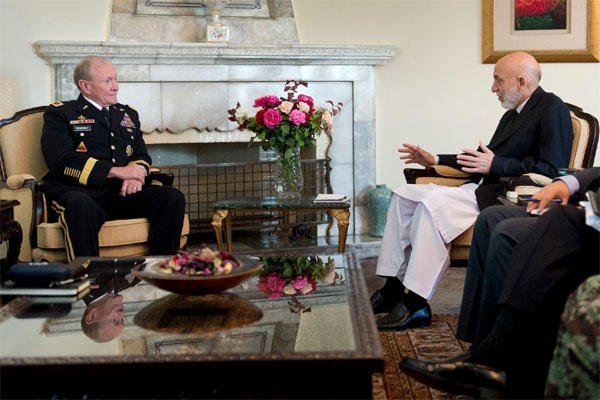Gen. Martin Dempsey came away from meetings with Afghan President Hamid Karzai in Kabul Monday having made little progress toward setting terms for a U.S. and NATO presence in Afghanistan after 2014.
"Militarily, I would like to understand the future more clearly through the Bilateral Security Agreement, sometime between now and October," Dempsey, the chairman of the Joint Chiefs of Staff, said following the talks with Karzai, the Associated Press reported.
Karzai angrily broke off negotiations earlier this month on a post-2014 coalition military presence in Afghanistan, charging that his government was left out of the loop on U.S. efforts to jumpstart peace talks with Taliban representatives in Doha, Qatar.
The U.S. currently has about 66,000 troops in Afghanistan and that number was expected to go down to about 34,000 by the end of 2013. President Obama has committed to having all U.S. and coalition combat forces out of Afghanistan by the end of 2014.
The U.S. and its allies have been negotiating with the Afghans, and among themselves, for months on the size of a training and advisory force that would be left behind after 2014.
In response to Karzai's breaking off talks on a Bilateral Security Agreement, the White House has floated the so-called "zero option" – meaning that no U.S. and coalition troops would remain after 2014 and the Afghan National Security Forces would be left to defend the country on their own.
Dempsey said he was against the zero option, but allowed that it was a possibility if the Afghans remained intransigent.
"No one asked me to prepare a zero option. I don't recommend a zero option, but there could be a zero option, because we can only stay here if we are invited to do so," Dempsey said. "And that is why I am so personally committed to doing anything I can do to set the conditions for this Bilateral Security Agreement."
Dempsey said he expected an agreement with Karzai on a Bilateral Security Agreement to be worked out eventually.
"The conversation was very positive," Dempsey said of his talks with Karzai. "I left truly believing that he is as committed as we are to implement the Bilateral Security Agreement."
In his last conference call to the Pentagon in June from Kabul, Marine Gen. Joseph Dunford, head of the International Security Assistance Force, said he was proceeding with planning for a post-2014 residual force and expected to give details on his recommendations for the size and placement of the force in the fall.
Dunford said he had ample time to make recommendations while awaiting President Obama's approval.
"With regard to why the President hasn't made a decision to date, I suppose it's because he wasn't ready to make a decision right now," Dunford said. "And again, what I've told [Defense Secretary Chuck Hagel] is, I'm comfortable with having numbers in the fall -- works for me."
Dempsey's visit to Kabul came a day after a Pakistani emissary sought to assure Karzai that Pakistan was not working behind the scenes to undermine the Kabul government in the stalled process to open up channels with the Taliban in Qatar.
Pakistan is backing the Afghan government's demands that any negotiations with the Taliban be "Afghan-led and Afghan-owned," said Sartaj Aziz, a top adviser to new Pakistani Prime Minister Nawaz Sharif.
Karzai and other Afghan officials have charged that Pakistan was supporting the Taliban, but Aziz insisted that Pakistan was neutral and would not meddle in internal Afghani affairs.
The U.S. Embassy in Kabul put out a statement on the visit of Aziz, stating that "An Afghan-led and Afghan-owned peace and reconciliation process is the surest way to end violence and ensure lasting stability in Afghanistan and the region. We are thankful for the support of Pakistan for Afghan-led reconciliation," the statement said.





























